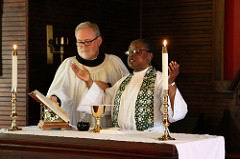Third Sunday after Pentecost, Year A, Proper 7A
June 25, 2017
Lessons: Jeremiah 20:7-13, Genesis 21:8-21 (Alternate First Reading), Psalm 69:7-10, [11-15], 16-18, Romans 6:1b-11, Matthew 10:24-39
Theme: God’s faithful and generous people are aware that stewardship does not involve taking the “easy path” along the discipleship trail; instead, we follow Jesus’ way, a way that involves losing life to find it.
Key Scripture: Those who find their life will lose it, and those who lose their life for my sake will find it. — Matthew 10:39
Preaching/Teaching Reflection
Can we acknowledge one thing right up front this week? These are tough lessons. Coming not long on the heels of the mighty winds of Pentecost, our options for preaching and teaching this week may elicit more pastoral whimpers of dread than powerful “Amens! of anticipation.” I mean, really, do you like preaching about the rigors and difficulties of Christian life? Is it easy to teach that the life of faithful discipleship is not all rosebuds, kittens, and lollipops? After all, in a lot of churches it’s hard enough to keep the faithful sufficiently motivated and interested to file in for Sunday’s worship.
Could this actually be a large part of the problem? Do we spend too much time trying to make Christianity “palatable” for the masses, expending effort on crafting worship “experiences,” and trying just a little too hard to make it cool at the expense of keeping it real? Do we sacrifice content in a quest for greater numbers and better demographics? Is it even a tiny bit worrisome that the faith community down the street seems to be doing a bang-up job of packing ‘em in on Sunday morning?
Easy is not always the answer. In fact, most things truly worth having require expenditures of time, effort, and energy. Why should we expect the journey of faith to be any different? If Jesus’ life and ministry and the paths of his early followers are our model, most of us are in real trouble!
In the 21st century, it’s the exception rather than the norm to be persecuted for one’s faith or to risk losing one’s life to follow Jesus. For us in the developed world, it’s more the case that we will be altogether ignored as irrelevant and out of touch with reality. We Christians no longer dominate the culture. In the face of this reality, maybe we all ought to be whimpering and lamenting what we’ve become.
Where is Christ’s church growing the most and the fastest? It doesn’t take a Ph.D. to figure that one out. Just look to the places where there is poverty, difficulty, famine, and strife; there you’ll find the church growing. There you’ll find disciples in the making. And there you’ll find Jesus in the midst of pain and suffering lifting up his people, strengthening them, and abiding with them. Of course, Jesus loves the rich and privileged, too, but it’s a lot more difficult to see Jesus when you don’t really need him or lack room for him in your already full and satisfying life.
So dear preacher and teacher, I wish I could tell you I had easy ideas for how to make these lessons sit well in the ears and hearts of the privileged folk that many of us serve, but I can’t. A wise mentor once told me, “If you’re not irritating folks at least a few times a year, chances are you’re not really preaching the gospel.”
Consider this a “burr under the saddle” kind of Sunday. Yes, there’s grace in the gospel, but this week it’s all wrapped up in a bitter reality of the real cost of discipleship. Jesus makes it abundantly clear that a partial commitment doesn’t cut it. He wants each and every one of us, AND, he wants all of us. Every last hair on our heads, every ounce of our energy and dedication; Jesus demands our full participation.
Want to find real life? You gotta lose everything that stands in between you and Jesus. No fooling. No justifications. It’s an all or nothing proposition that we can’t accomplish on our own. Thankfully, that’s where the Holy Spirit and the merciful love and grace of God come into play. So go ahead, faithful servant. Put all your cards on the table; lay your soul
bare and leave nothing in the pulpit. Know that God is with you. The bread and cup await you. You are not alone, but you have to be a loser to be a keeper in the divine economy. Trust the one who lost it all for you–it’s a win/win proposition.
In Worship
This week consider approaching the psalm as a dramatic reading for seven voices with congregational response.
Voice One: It is for your sake that I have borne reproach, that shame has covered my face.
Response: Hear our cries, O God!
Voice Two: I have become a stranger to my kindred, an alien to my mother’s children.
Response: Hear our cries, O God!
Voice Three: It is zeal for your house that has consumed me; the insults of those who insult you have fallen on me.
Response: Hear our cries, O God!
Voice Four: When I humbled my soul with fasting, they insulted me for doing so.
Response: Hear our cries, O God!
Voice Five: When I made sackcloth my clothing, I became a byword to them.
Response: Hear our cries, O God!
Voice Six: I am the subject of gossip for those who sit in the gate, and the drunkards make songs about me.
Response: Hear our cries, O God!
Voice One: But as for me, my prayer is to you, O Lord.
Response: Hear our prayers, O Lord!
Voice Two: At an acceptable time, O God, in the abundance of your steadfast love, answer me.
Response: Hear our prayers, O Lord!
Voice Three: With your faithful help rescue me from sinking in the mire; let me be delivered from my enemies and from the deep waters.
Response: Hear our prayers, O Lord!
Voice Four: Do not let the flood sweep over me, or the deep swallow me up, or the Pit close its mouth over me.
Response: Hear our prayers, O Lord!
Voice Five: Answer me, O Lord, for your steadfast love is good; according to your abundant mercy, turn to me.
Response: Hear our prayers, O Lord!
Voice Six: Do not hide your face from your servant, for I am in distress—make haste to answer me.
Response: Hear our prayers, O Lord!
Voice Seven: Draw near to me, redeem me, set me free because of my enemies.
Response: Into your hands we commend our fears, our pain, our sorrows, our hopes, everything we have and are. Amen.
With Youth
Dead to sin; alive to God in Christ Jesus. This is what Paul writes to the Romans about what it means to be a new creation, a new being in Christ. That’s great in abstract, but how does this play out in real life? How do we die to sin each day and rise to new life in Christ? How can we find ways to remember this on a daily basis? Invite the youth to engage in small-group discussion about this topic. After some conversation, challenge each group to illustrate the verses from this week’s epistle lesson (Romans 6:1b-11) in a single image, a collage of images, a skit, a poem, or video. Be sure to share, discuss, and celebrate the results of their efforts. You might be amazed at what they create. Consider using either The Message or the Common English Version to help the youth get a more modern take on Paul’s language.
With Children
Today’s gospel lesson reminds us that we can live fearlessly as Christians because God loves us and values us. God values us more than a tiny bird–a common sparrow. God even knows, according to Jesus, the number of hairs on our head. Invite the children to guess how many hairs the average person has on his or her head? Consider all answers. According to most sources, the average head of hair numbers about 100,000. Granted some people have more than others! So if God knows about 100,000 hairs on each person’s head, that means God can count a lot of hairs (Thank goodness God doesn’t seem as inclined to split hairs as much as we humans do!). Multiply 100,000 x the number of children present. Do the same math for your congregation’s membership. If you can, consider totaling the approximate number of hairs for your town. The point is that God knows the exact number for each one of us – that’s how important we are to the God who created the entire universe. We may be mighty small and feel plenty insignificant, but that’s now how God views us! And that is very good news! End with a simple prayer.
Weekly Stewardship Bulletin Insert
This week we learn that being a faithful steward and disciple means being a real loser. Our gospel lesson from Matthew makes clear the high cost of following Jesus. We may sometimes question whether it is really worth losing that which is dear and important to us. The world would tell us no, but we know better. In losing we gain real life in Christ!
Stewardship at Home
Losing it to live? How can this be? In our world today, many things clamor for our attention, seeking to turn us from following Jesus. Not much has changed in the last two millennia either. In the gospel lesson Jesus lays out a sobering look at discipleship and stewardship. This week spend some time exploring what gets in the way of your relationship with Jesus. What choices do you make with your resources that might cause you to be less generous in your giving to support mission and ministry? What activities pull you away from time in the beloved community and seek to draw your heart away from God? Pray daily for clarity, for wisdom, and for willingness to “lose” whatever is getting in the way of deeper discipleship.
Note: Reprint rights granted to congregations and other church organizations for local, nonprofit use. Just include this note: “Copyright (c) 2017, Rev. Sharron Blezard. Used by Permission.” Other uses, please inquire: thewritelife@hotmail.com.
Photos: Jun, Lenore Edman, and Episcopal Diocese of Southwest Florida, Creative Commons






Leave a Reply